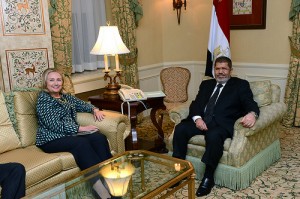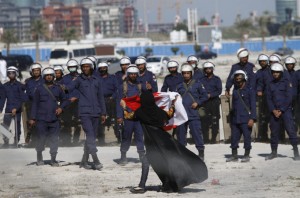The bad news about Egyptian President Mohamed Morsi’s expanding constitutional powers in Egypt is the threat of another dictatorship in Egypt. The good news is that normal politics is returning to Egypt after decades of brutal authoritarian regimes.
Recent mass demonstrations in support of and opposition to Morsi’s new draft constitution [...]]]>
 The bad news about Egyptian President Mohamed Morsi’s expanding constitutional powers in Egypt is the threat of another dictatorship in Egypt. The good news is that normal politics is returning to Egypt after decades of brutal authoritarian regimes.
The bad news about Egyptian President Mohamed Morsi’s expanding constitutional powers in Egypt is the threat of another dictatorship in Egypt. The good news is that normal politics is returning to Egypt after decades of brutal authoritarian regimes.
Recent mass demonstrations in support of and opposition to Morsi’s new draft constitution and the political tug of war between Morsi and the judiciary — especially the Judges Club — signify healthy signs of democratic politics, which the Egyptian people fought for before and since Tahrir Square.
Egyptians are openly debating the meaning and implications of each of the 234 articles in the new constitution, ranging from the establishment of a four-year presidential term that can be served twice, to freedom of worship and social justice.
Opponents of the document correctly claim that it’s excessively religious, especially with the role assigned to al-Azhar Islamic University, and is barely inclusive. Rights of women and minorities are not clearly spelled out although followers of other Abrahamic religions have the right to select their own religious leaders and conduct their personal status matters according to their religious dictates.
These raucous and often turbulent constitutional debates and the verbal scuffles between the judiciary and the executive branch seem to signal the advent of rational politics and the promise of pragmatic political compromises. The upcoming popular referendum on the document will tell whether the Egyptian people support or oppose the draft document.
Egypt has not witnessed or enjoyed this type of political jockeying at the popular level since before the middle of the last century. Even if the draft constitution is adopted, Morsi can serve a maximum of two terms — something Egyptians have not known for generations.
The United States should not get involved in this debate and should allow the Egyptian people to sort out their political differences. Privately, Washington should point out to Morsi that tolerance, inclusion, and minority and women’s rights should be the hallmark of governance in the new Egypt.
Constitutional tensions in Egypt, however, should be viewed in the broader context of the emerging Arab Sunni order in the region. This new regional alignment is led by Egypt, Qatar, Saudi Arabia, and Jordan, and tacitly supported by Turkey. It is perceived in the region and globally as a front to isolate Iran and diminish its regional influence, speed up Bashar al-Assad’s fall, and help break up the Iran-Syria-Hizballah “Axis of Resistance.”
This Sunni architecture could also pull Hamas away from the Iran-Syria camp and move it closer to the Sunni fold. The recent military confrontation between Israel and Hamas in Gaza had the unintended consequence of strengthening Hamas’ regional posture and cementing relations between it and Sunni Arab leaders, ranging from Qatar to Tunisia.
Although Washington has quietly endorsed the new regional Sunni politics, US policymakers and intelligence and policy analysts should consider the possibility that in the long run, the new order could also spell trouble for Arab democratic transitions and for the West. The short-term gains, while critical for the region, are already happening. Iran is becoming more isolated and its relations with Arab states and non-state actors are fraying.
Assad is on his way out, and within months or even weeks, Syria will begin to experience the convulsions of a new political order. Forceful Western warnings from President Barak Obama, Secretary Hillary Clinton and others against the possible use of chemical and biological weapons could be the prelude of Western military intervention in Syria.
The Hizballah alliance with Iran and Syria is already breaking up. Hizballah and its leader Hassan Nasrallah have lost much of their legitimacy as a symbol of resistance or “muqawama.” Nasrallah’s vocal and consistent support of Assad is viewed in the region as naked real politic, which has undercut his standing as a regional leader.
In the long run, the emerging Sunni order could undermine the gains of the Arab Spring and threaten the transition to democracy in post-authoritarian Arab countries. More importantly, the new order could embolden Sunni regimes in Saudi Arabia, Bahrain, and elsewhere in their continued repression of their Shia communities and other ethnic and religious minorities.
While the leaders of Saudi Arabia and Qatar are pushing for Assad’s removal, they are not necessarily wedded to democratic principles or to granting their citizens, especially in Saudi Arabia and Bahrain, equal rights. Nor are they enamored by the principles of “freedom and human dignity” highlighted in the Egyptian draft constitution.
Unless the emerging Arab Sunni order commits itself to the principles for which millions of Arab youth fought for two years ago, and unless it goes beyond just containing Iran and toppling Assad, it will remain problematic and fraught with uncertainty.
- Emile Nakhleh is the former director of the Political Islam Strategic Analysis Program at the CIA and author of A Necessary Engagement: Reinventing America’s Relations with the Muslim World
]]>This week’s decision by the Bahraini court of appeals to uphold the prison terms against Bahraini opposition activists is a travesty of justice and an indication that Bahraini repression continues unabated.
Bahraini officials, when confronted with angry world reaction to the court’s decision, cynically hid behind the claim they would [...]]]>
 This week’s decision by the Bahraini court of appeals to uphold the prison terms against Bahraini opposition activists is a travesty of justice and an indication that Bahraini repression continues unabated.
This week’s decision by the Bahraini court of appeals to uphold the prison terms against Bahraini opposition activists is a travesty of justice and an indication that Bahraini repression continues unabated.
Bahraini officials, when confronted with angry world reaction to the court’s decision, cynically hid behind the claim they would not interfere in the proceedings of their “independent judiciary”.
Despite the threat to U.S. national interests and the security of U.S. citizens in Bahrain and elsewhere in the Gulf, Washington remains oblivious to the ruling family’s violent crackdown against peaceful protesters in the name of fighting “foreign elements”. Pro-democracy Bahrainis are wondering what we are waiting for.
Because of our muted reaction to what’s happening in Bahrain, the ruling family and their Saudi benefactors have not taken seriously Western support for democratic transitions in the Middle East.
The United States and Britain maintain deep economic and security relations with these states but also enjoy strong leverage, including the U.S. Navy’s Bahrain-based Fifth Fleet, which they must revisit in the face of continued egregious violations of basic human rights by some of these regimes. Bahraini civil rights organisations and activists are expecting the United States to use its leverage to end regime repression.
Despite their pro-Western stance, there is nothing exceptional about the autocratic Gulf Arab regimes. And they should no longer be given a pass on the importance of democratic reform.
Staying in power will require Bahrain’s Al Khalifas and other Gulf tribal family rulers to do more than push a vicious sectarian policy and employ slick public relations firms. Their cynical and deadly game might buy them some time, but, in the end, they will not be able to escape their peoples’ wrath.
In the absence of genuine reforms in the next three years, the Gulf’s autocratic regimes will be swept aside by their peoples. The “people power” that emerged from the Arab Spring in Tunisia, Egypt, Yemen, Libya, and now Syria, cannot be kept out of these tribal states. In reality, they all have been touched by peoples’ demands for dignity and justice.
While Iran might be exploiting the protest movement to discredit these regimes, the pro-democracy movement in Bahrain goes back to the 1960s and 1970s – way before the Islamic Republic came on the scene.
Even more troubling for U.S. national security are the continued efforts by Al Khalifa to whip up anti-American attitudes among Bahrain’s more rabidly anti-Shia and xenophobic Sunnis. Bahrain and some of their Gulf Co-operation Council (GCC) allies perceive the growing rapprochement between the U.S. and the new Islamic democrats, such as the Muslim Brotherhood in Egypt and Tunisia, as a sign of tacit opposition to Gulf autocrats.
They believe the U.S will throw them under the bus if their peoples rise up against them. They also worry that if the nuclear issue in Iran is resolved, a possible U.S. rapprochement with Tehran would embolden their Shia communities in their struggle for equality and justice.
For 40 years, Prime Minister Khalifa has been the key opponent to reform in Bahrain. In recent ears, however, a new generation within the ruling family, known as the “Khawalids,” has taken up the anti-Shia, anti-reform, and anti-American cry.
They have used pro-government newspapers, blogs, and social media to vilify the Shia, the United States, and the pro-democracy movement. With tacit government encouragement, they frequently describe elements of the opposition as “diseased cells” that must be removed from society.
In the process, they have encouraged extremist Salafi and other Sunni groups to spread their message of divisiveness, sectarianism, and hate.
What Bahrain and the other Gulf sheikhdoms fail to realise is that when they encourage extremist groups to fight the “enemies” of the regime, a time will come when radical Salafi “jihadists” will turn against the regime. The Saudi experience in Afghanistan and Iraq should offer them a sobering lesson. This dangerous game does not bode well for their survival.
As domestic challenges also grow in Saudi Arabia, the Kingdom’s interest in Bahraini domestic policy will diminish. Recent estimates indicate Saudi oil exports over the next decade and a half will shrink significantly because of growing domestic needs for energy to generate power and desalinate seawater.
When this happens, Al Khalifa will have to face their people on their own.
- Emile Nakhleh is the former director of the CIA’s Political Islam Strategic Analysis Program and author of “A Necessary Engagement: Reinventing America’s Relations with the Muslim World”.
]]>